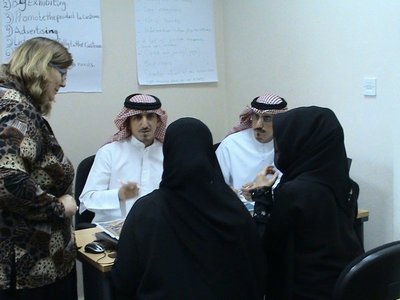The UW will expand its certificate program at the United Arab Emirates Academy in Abu Dhabi. On June 2, UW President Mark Emmert and Mohammed Omar Abdullah, undersecretary for the Abu Dhabi Department for Planning and Economy and chairman of the Abu Dhabi academy, signed an agreement that will add courses to the program, and perhaps expand it to other Persian Gulf countries such as Kuwait, Qatar and Saudi Arabia.
The partnership marks the first time the UW has established a base to teach foreign nationals in their own country. Roughly 3.5 million people live in the United Arab Emirates, but citizens of other countries comprise the majority of the workforce. The country’s leaders aim to change that proportion, in part by increasing the number of UAE citizens in the workforce.
Speaking to about 15 people gathered in the Regents Room for the signing, Emmert said other American universities have rushed to establish foreign campuses without establishing sufficiently strong relationships in the host countries. In 10 years, Emmert predicted, a good many of those campuses will have packed up and returned to the U.S. because relationships haven’t gone deep enough. In contrast with this, he said, the UW is looking for serious, long-term ties.
“We have to build relationships at the grassroots level, as they will sustain our partnerships over the long run,” Emmert said. The UW has had decades-long relationships in countries such as Korea and Japan, and recently opened an office in Beijing.
This week, Abdullah and Magdi Hafez, president and CEO of the academy, will talk with various UW administrators, including Mani Soma, professor of electrical engineering; Sandy Archibald, dean of the Evans School of Public Affairs; Pat Wasley, dean of the College of Education; and James Jiambalvo, dean of the Michael G. Foster School of Business.
Founded by the Abu Dhabi Chamber of Commerce, the academy focuses on students who have undergraduate degrees, aiming to bridge the gap between a university education and practical job skills. Most courses are taught by instructors hired in the UAE who initially team teach a course with a UW instructor. Content comes from the UW, but is localized via tools such as case studies. Courses typically meet 90 hours over five to 10 weeks. Current courses include business English communication, travel and tourism, human resources and business for international professionals. They emphasize critical thinking and teamwork, concepts highly valued in the corporate world, and thus important to the UAE, said Marisa Nickle, UW Educational Outreach program manager based in Abu Dhabi.
Since UW Educational Outreach began offering courses at UAE Academy in February 2007, about 141 students have enrolled, including the current 30. Course fees are paid by the government, and the program is self-sustaining.
About 80 percent of UAE students are women. Abdullah and Hafez explained how in the Arab world, men have more job opportunities than women, especially early in life. After high school, men often work in their families’ business, become entrepreneurs or take military or police jobs rather than attend college.
Women outnumber men in Arab universities not only because of cultural attitudes about jobs, but about study abroad. Most women have undergraduate degrees before pursuing graduate work outside their country.
New exchange programs and cross-cultural exposure may grow out of the UW presence in the UAE, said Dave Szatmary, vice provost for Educational Outreach. Now serving about 38,000 students, Educational Outreach offers certificate programs, English language programs, distance and online learning, and master’s degrees.
